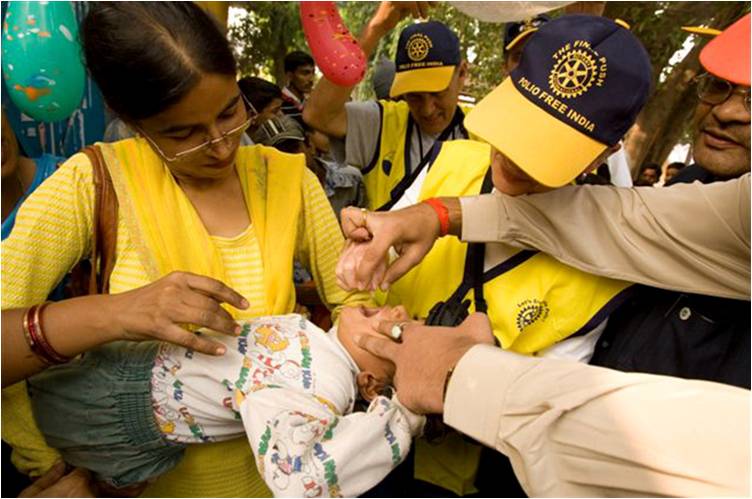Go ahead, hug a Rotarian
Posted by Daniel Hoornweg on February 21, 2017

In 1979, Rotary clubs helped deliver polio vaccines to more than six million children in the Philippines. This effort expanded in 1985 through the launch of PolioPlus, which included Rotary International’s campaign to raise $120 million. It was the first and largest internationally coordinated private-sector effort to support public health.
When the program started, there were about 350,000 cases of polio in 125 countries. The incidence is down 99.9% and today polio afflicts only Afghanistan, Nigeria and Pakistan (about 37 cases in 2016).
With continued vigilance, the world is on track to see its last case of polio within a handful of years. Eradicating a disease as widespread and tenacious as polio is an impressive feat. From that initial $120-million campaign, Rotary has since contributed more than $1.6 billion and countless volunteer hours to the initiative. Funds were matched and multiplied by groups like the World Health Organization, US Center for Disease Control, UNICEF and governments around the world. Every dollar Rotary contributes to 2018 is matched two-for-one by the Bill and Melinda Gates Foundation.
Canada also deserves considerable credit. It was the first country to support the Global Polio Eradication Initiative and since 1988 has provided more than $580 million, as well as a good share of Rotarians. Of course, the lion’s share of credit goes to the millions of community organizers and health care providers in countries that administered more than 2.5 billion inoculations.
Over the years, I have given several talks at Rotary Clubs and contributed a few of my own ‘happy dollars’. When I was working at the City of Guelph, Rotary quickly rallied behind the call for recycling. I saw firsthand the impact of volunteers like Rotarians when I was managing a Kampung (neighborhood) Improvement Program (KIP) in Jakarta. The project had a small component of micro-credits for female entrepreneurs. The advice and support provided by Rotarians was more valuable than the money.
Margaret Mead probably was not thinking of Rotarians when she said, “Never doubt that a small group of thoughtful, committed citizens can change the world; indeed, it's the only thing that ever has”. However, Rotarians are a great example of this truth.
Our better angels stand ready for flight, and if need-be, will fight. The thing that gives them strength and voice is optimism. Much of the world seems to be going through a rough patch as big changes manifest. Fortunately, as we see in polio’s near-eradication, it is proof that thoughtful, committed citizens can still change the world, especially when assisted by their governments and others that can mobilize funding. More agents of change are needed.
Here’s a thought: In the next year or two when the war against polio looks to have been all-but-clinched, let’s give every Rotarian we know $100 and ask for an encore. The world today seems full of reasons why things will not work. But, hope and optimism can trump fear and dismay when we believe in the power of one, then a couple people come together, and then a small group of concerned and active citizens. Most of us know at least one Rotarian, and through them, when that last case of polio is history, we will see how hope and perseverance matter most. Well worth a hug.
Filed under: Sustainability 101
